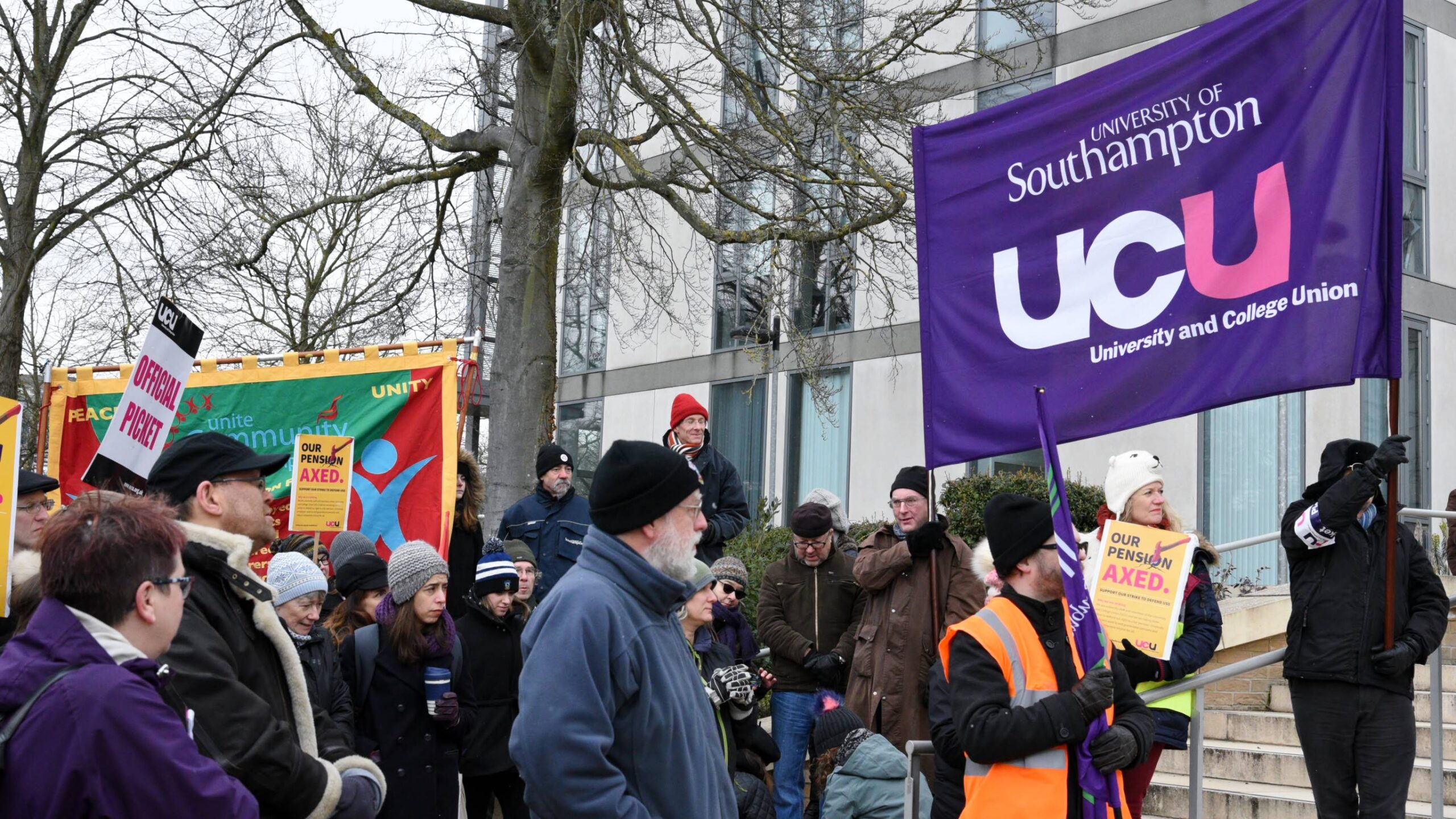While for the average member of the public the industrial strategy might just be that thing the government drones on about while guaranteeing a £1.5bn loan for Jaguar Land Rover, it’s been one of the key talking points and organising principles in higher education policy in 2025 – at least in the English system, despite the strategy being UK-wide.
The run-up to June’s publication of the finalised strategy was characterised by plenty of debate about whether sufficient recognition was being paid to higher education’s role, and far less – depressingly, but rather characteristically for the sector – about how the strategy seeks to reshape the higher education and research systems to achieve its ends.
As an indicative example, one entirely unremarked on aspect of the strategy – admittedly buried in a complicated graphic on page 34 of the technical annex – was that one of its outputs is increased enrolments in higher education and apprenticeship subjects that address skills shortages in the eight chosen sectors. In the strategy’s theory of change, an output is the result of a policy intervention, and some 18 are chosen in all – one of them involves changing what subjects higher education students study. This was surely worthy of closer attention.
Six months after publication, we can see the industrial strategy showing up all across the new HE landscape that Labour is oh-so-gradually taking steps to unfurl – in the Lifelong Learning Entitlement, in maintenance grants, in capital funding, in high-cost subject premia, in local innovation funding, in PhD scholarships, in strategic research funding. In some of these areas we just have mere hints to go on, whereas in others the strategy is already a central organising idea. It’s also clear that in different areas of government, the strategy is being interpreted in different ways and used to achieve different priorities.
We’re going to take a run through all of this, and attempt to gauge where the strategy is cutting deep and where it’s running pretty shallow. But to begin with we need to look back over the development process since Labour came to power, in order to understand what the industrial strategy is seeking to achieve and – just as importantly – where.
From green to white
The Invest 2035 green paper in autumn 2024 chose eight “growth-driving sectors” to be the focus of policy intervention and prioritisation (cue a degree of huffing and puffing that universities were not given enough prominence). This was followed by a consultation to greatly refine the detail and identify sub-sectors within each that were most key.
Each of those concepts got a rebrand – the growth-driving sectors became the IS-8, the sub-sectors were rebadged as “frontier industries” – but at heart this was the thrust of the move from green paper to finalised strategy: a process of concentrating on a subset of the initial sectors.
If you’re interested in how these choices were made, we are told that a five-point assessment of different possible sub-sectors took place, based around the criteria of growth potential, strategic alignment, sector interconnectedness, rationale for intervention, and presence of policy solutions.
Here they all are (the IS-8 are the headings in red boxes, while the frontier industries are the bullet points):
(the frontier industries in the finalised defence industrial strategy, published in September, were essentially unchanged)
So with the chosen priority areas selected, our next step would be to think about how higher education fits in, you would think. But there’s a further element that is regularly overlooked – how the industrial strategy relates to place.
A bowl of clusters
The final strategy is clear throughout that its “picking winners” philosophy extends not just to specific parts of the economy, but also to the location in which they will be supported:
The Industrial Strategy will concentrate efforts on those places with the greatest growth potential for the IS-8 sectors, namely city regions and clusters.
The focus on sectors “cannot be divorced from considerations around place,” we are told – the “specific relationships between sectors and between places” has to be part of the equation. “All economic activity occurs somewhere,” it uncontroversially emphasised. All this focus on place “does not preclude” support for sectors in other, non-beknighted locations, however. And so:
We focused on identifying and prioritising those city regions and clusters most important to the delivery of the Industrial Strategy. This process identified a set of unique city regions and clusters across the IS-8. To drive effective policy and maximise their growth potential, we also considered the interconnections between them.
A cluster, in case you were wondering, for the purposes of the strategy is a geographically-connected network of “businesses, research capabilities, skilled talent, and support structures in related industries.” These ecosystems bring benefits of proximity for the businesses within them, including “deeper labour markets, knowledge sharing, innovation spillovers, and collaboration opportunities.” Their specificity makes them “well-suited to benefit from targeted support.”
Similarly to the frontier industries, the move from green to white paper saw a process of cluster identification, which we’re told in the technical annex involved qualitative and quantitative analysis and engagement within government and with external experts, all to draw up a longlist (which we don’t get to see). This was then winnowed down to retain those with “highest growth potential” for each sector. Here’s a diagram of the process, for reference:
In terms of the results – well, if you’re searching for specificity on exactly what is covered by each cluster, the finalised strategy documents don’t make it easy for you to pinpoint what’s included. Here’s the map for advanced manufacturing, taken from the technical annex again:
This, however, assigns geographies to the sector as a whole, rather than to particular priority industries. For that, we need to look at the sector plans which (for the most part) were released alongside the industrial strategy. Here’s the first part of the map for advanced manufacturing again, this time with the priority industries specified:
The regions in question are very broadly drawn at times – the clean energy industries map groups together Oxford and Solent (two areas which are not connected in any way, surely?) and has one “Scotland” cluster which includes Aberdeen, Highlands and Islands, the North Sea coast and, oh, the entire Central Belt. The bullet points are odd too, a mix of promotion of existing capacity and plans for future actions.
There’s a much more thorough mapping of industrial strategy sector geographies available in the form of the DSIT cluster map, which was one of the inputs to the selection process. However, it’s only currently available for five of the IS-8, and is at the sector, rather than subsector, level.
Handily, the map lets you superimpose university and R&D facility locations onto the clusters, which in theory would let you assess which are the “right” places for different kinds of higher education provision and research, were you so minded.
It’s not clear this is on the government’s radar for tying together industrial strategy and HE policy, however – rather, what we’ve seen so far largely has its roots in a different way of thinking about the country’s skills needs.
Demand for priority skills
To recap: in order to finalise the industrial strategy, the Department for Business and Trade identified priority sectors (and “frontier” sub-sectors) of the economy, and engaged in a degree of prioritising certain places. At the same time, Skills England was taking a complementary but at the same time rather different approach – identifying priority occupations and priority skills.
The main piece of work here was the quango’s Assessment of priority skills to 2030 report, which we looked at when it first arrived in August. But it’s worth going over some of the main beats of the analysis performed, and recognising how it represents certain choices beyond what the industrial strategy itself set out.
The report looks at “future employment demand across 10 key sectors important for delivering the government’s Industrial Strategy and Plan for Change priorities” – see our initial coverage for some of the oddities in how this forecasting was performed, but what’s done is done – and then goes on to pinpoint the “key education pathways” associated with the priority occupations in these sectors.
In addition to the IS-8, Skills England had been asked to roll in both health and social care and construction. For each of the ten sectors, it looks at a specific subset of occupations – those where there is expected growth in employment, current skills shortages, general “high demand” or which are otherwise judged important in some way. Each list was chosen by the lead government department for the sector in question.
By my calculations – removing the duplicates on the “priority occupations” tab of this spreadsheet – this brings us to 148 unique occupational areas which, in theory at least, are now the government’s priorities. This is as defined by SOC20 units (the four-digit codes), of which there are 412 in total. Feel free to check whether your job is there or not.
This wasn’t all though. Skills England then took an additional step – some might say leap – in plotting a link between these priority occupations and higher education subject of study. In coming to a judgement about what education pathways “feed” the priority occupations, one approach would be to actually look at the occupations themselves (for example, musicians are one of the priority occupations in the creative industries sector, so surely music degrees would be a winner?). But a different approach was taken, one that aggregates up degree choice and field of employment.
As seen in table 6 of the report (and in an expanded version in the accompanying spreadsheet), what Skills England chose to do instead was to generate a percentage for each subject area – at the very top level of the Common Academic Hierarchy classification, i.e. the broadest possible brush – according to the historic likelihood that a graduate of a degree in that field would go on to be employed in a priority occupation:
The probabilities were applied to a cohort of education leavers from LEO Graduate and Postgraduate Outcomes who were in sustained employment in the year after education, to estimate their occupations at 4-digit SOC. We include graduates and post-graduates employed in the 2021 to 2022 tax year and who graduated in 2019 to 2020 academic year.
This, essentially, generates a ranking of higher education subjects, by their past propensity to funnel graduates into a list of priority occupations chosen by government departments. These choices tie in with – but are very much not the same as – the industrial strategy. They are also place-blind, in a way that the strategy sought to avoid.
Not just a desk exercise
While the fact of the Westminster government deciding that there are certain occupations that are more of a priority than others is notable in itself, the Skills England report isn’t just a fun bit of modelling – policy consequences have followed, even if they haven’t been spelled out.
For one thing, the top ten ranking of priority subject areas has given rise to the list of subjects eligible for modular provision under the Lifelong Learning Entitlement. It took a bit of digging at the time for us to make that connection, but it’s since been essentially confirmed by DfE.
The list isn’t exactly the same – medicine and pharmacy aren’t given the LLE nod, presumably not being seen as well-suited for unbundling. And Skills England’s analysis found that business and management degrees had a higher likelihood (53 per cent) of leading to employment in a priority occupation than health and social care degrees (51 per cent) – again, you can imagine the careful political choices being made there, though further transparency from the department about what exactly its thinking is for modular study would have been welcome.
If you’re not a big believer in the presence of much demand for loan-backed modular study, this may seem like only a minor exercise in picking winners, especially as the government has said that the current list is, in theory, just a starting point. More important, perhaps, are the clear indications that a similar process will be used for determining which courses of study are eligible for maintenance grants. The department had previously indicated that it would use much the same list as for the LLE, only to somewhat walk this back in the slight policy paper that accompanied the Budget:
It is crucial that the list of subjects eligible for maintenance grants is informed by the best and most up-to-date evidence on skills needs. This list will be confirmed in advance of grants being introduced in the 2028 to 2029 academic year.
We will: draw on further stakeholder engagement and ongoing work from Skills England to assess future employment and skills priorities; explore alignment with the subject lists for Lifelong learning entitlement (LLE) modular and priority additional entitlement funding.
What we can read into this is that a similar process will probably be employed, though coverage might not match up precisely, especially if you are erring on the side of scepticism regarding how much funding is going to be put towards the grants (or optimistically pinning hopes on ministerial nods to rolling it out further in future years).
The third area where we might expect the Skills England subject ranking to show up in policy relates to the ongoing reforms to the Strategic Priorities Grant (SPG). Returning to the parliamentary written answer referred to above – which in passing I will observe seems an odd thing for former Reform MP James McMurdock to have been asking after – the Skills England list is also juxtaposed with plans to align SPG funding with “the priority sectors which support the Industrial Strategy and the Plan for Change and future skills needs.” Making high-cost subject funding more effectively targeted towards what was then termed “priority provision” was first announced in the SPG guidance letter to the Office for Students back in May.
Given the specific choices made in translating “priority sectors” into “priority subjects”, it’s worth considering a few further consequences of the department’s decision to use Skills England’s analysis in Assessment of priority skills to 2030 as a basis for determining subject-level policy decisions. First, even if you go along with the logic steps in the process, it is noticeably based on old data. Is it possible that at some point the modelling gets updated with new graduate outcomes figures, and we see (say) chemistry no longer make the top ten, with its spot taken by languages and area studies (for example – it was only a handful of percentage points lower down on the ranking generated by data from the 2021–22 tax year)?
This wouldn’t be any kind of stable basis on which to determine which subjects are funded as high cost, which are in scope for modular provision, and which attract small maintenance grants for disadvantaged students. Yet taken to the extreme it’s the consequence of the way DfE has gone about its planning.
The approach also bundles together subjects into top-level classifications and then applies broad-brush percentage propensity scores to them, ignoring essentially any other factor, such as applicant or institution characteristics. Once you go down this road of picking priority subject areas, some loss of resolution is probably inevitable. But it didn’t have to be done in this way (indeed, as was much remarked at the time someone from the department stepped in and took out landscape gardening from the architecture, building and planning subject group, with no explanation given). If you’re going to pile one methodological assumption on top of another, shouldn’t the chosen process at least go out to consultation?
Cosplay
But methodology aside, there’s also a question of whether this approach is in the spirit of the industrial strategy, which as we have seen in its purified form had a focus on frontier industries and their geographical distribution.
Let’s take the Lifelong Learning Entitlement modular provision process as an example. If you want to apply to deliver a module of a full degree programme at level 4, 5 and 6, as we’ve already seen it will need to be in one of the subject areas generated from Skills England’s calculations – but also, you will need the Department for Education’s approval for it to qualify for loan funding.
The process of applying was set up in an interesting way. Providers are required to demonstrate that their modular “offer” has been developed in response to employer and learner needs. Applications will be required to have established relationships with employers or industry bodies relevant to the subject area, and show that specific employer (and/or learner) engagement in the module’s design has taken place. Indicative evidence includes letters of support from industry bodies, evidence of co-design of curricula, and even “learner or employer consultation summaries, surveys or focus group findings.”
This is quite the thing – the proportion of full degree programmes that could say they have been through such a process of due diligence is probably pretty slim. It’s a level of reflective employer engagement quite rarely seen in the sector, as opposed to gestures at the promise of fairly generic “employability” outcomes. Part of the reason for this is how time-consuming it appears.
There’s certainly a question whether all this admin is worth it – there are various other hoops to jump through as well, in order to demonstrate to DfE a track record of delivery over time as well as evidencing quality [sic] through continuation and completion data. It would make more sense if being able to offer modular provision through the LLE was really the treat that the government seems to be hoping, and you could be confident (as opposed to extremely sceptical) that you would have potential students knocking on your door to enrol on your freshly approved course.
But we could certainly draw some lines to the industrial strategy – not only has the provision been restricted (in a manner of speaking) to those subjects most relevant to the strategy, this provision is also directly linked up with the industries in question, and stems from engagement with specific areas, both in terms of prospective students and graduate employers. It’s also of a piece with the recent moves on local skills improvement plans that Labour is looking to nudge universities towards. Put simply, it is very out of character for higher education policy over the last decade or more to have the government approving whether provision can go ahead based on individual provider contexts, rather than what we might term the “have at” approach of letting anyone anywhere deliver anything and then seeing if the market will accommodate (if that is not too much of a simplification of post-2010 policy).
There is one mammoth caveat, however. The issue is that everything I’ve outlined above only applies to a small proportion of providers in England – anyone with a TEF gold or silver, or who had a suitable headline Ofsted rating back when they were not obsolete, can skip all of this. So all the finickety detail which gestures at a move to a different kind of system is basically irrelevant for all but a small number of providers who both performed poorly in the 2023 TEF (wait, wasn’t bronze a mark of “high quality”?) and who fancy throwing their very expensive hat into the LLE’s very small ring.
This is the perfect encapsulation of how the Department for Education’s adoption of the industrial strategy has – so far at least – the appearance of a performance rather than a real sea change. It is to an extent choosing priority subject provision that meshes with the strategy, though in a way that is very STEM-focused in a way that plenty of the strategy is not. And then it is more or less letting anyone participate who fancies taking a crack at it, with a small number of exceptions for whom the process would actually be much more in keeping with the strategy’s principles.
There are pragmatic reasons for taking an expansive approach to the LLE rollout, of course, given the well-founded fears about how much demand is there. It will be interesting to see how the approvals process develops over time.
The same could be said for both maintenance grants and SPG reforms. Tying them (in some way yet to be determined) to the Skills England list is a kind of gesture towards the strategy, but a more thorough engagement would involve thinking much more deeply about types of provision, specific subject choice rather than top-line groupings, and – most of all – place. At time of writing, there is little indication the department is minded to go in this direction for either policy.
And there is surely little appetite in the sector for it to do so. It would be highly interventionist, get bogged down in bureaucracy, and result in far more by way of “picking winners” than the current vibe of endorsing the idea of specialisation but doing little to make it happen. But you could make the case that it’s what an industrial strategy-led higher education policy should look like.
Other futures are possible
These particular moves are only a small slice of the much greater volume of work the industrial strategy has kicked off, much of it very relevant to higher education. For a start, the way the capital funding element of this year’s SPG allocations was set up was structured around the IS-8 sectors directly, rather than Skills England’s interpretation of which subject provision is most likely to feed them. In the winning bids we can see plenty of projects linked to areas of the strategy, such as creative industries or financial services, that have not made the cut for the LLE and presumably will not for maintenance grants either.
Skills England’s own future moves are important to watch as well. The work-in-progress UK Standard Skills Classification holds the potential for much more nuanced work about the links between study, employment and place than has filtered into policy so far.
On a larger scale, the sweeping changes to R&D funding which the government is slowly bringing to bear show a much more thorough engagement with the industrial strategy, even if the place elements are not always there. From our vantage point at the end of 2025, we can see a range of different ways the strategy is reflected in new initiatives, and different levels of prominence, from lip service to central governing principle.
The half a billion pounds in investment for the Local Innovation Partnership Fund has one of the tightest connections. Each “triple helix partnership” (which will include an academic institution) that wants to bid will need to define a cluster in which it will operate and link its proposal to strategic objectives such as the industrial strategy. For the open bidding competition, expert panel recommendations will inform a final decision from ministers – but in picking successful applications, the government will also “seek to ensure adequate geographic and sectoral balancing that aligns with regional assets and national capability.”
On the Innovate UK end of R&D, the industrial strategy is exceedingly directive. In advanced manufacturing, the government’s desire to directly support automotive industry R&D was so strong that it had to refer itself to the Competition and Markets Authority to ensure it wasn’t breaching laws around state aid.
For funding flowing solely to universities, the picture is not yet as clear. The reforms to Higher Education Innovation Funding (HEIF) announced in the autumn are more focused on economic growth in general. Revised accountability statements ask higher education providers to “consider” how to support the industrial strategy’s “key foundations”, but for now at least this sounds like an instruction to make passing reference to the strategy in one’s narratives, rather than a spur for deeper changes.
Over in the curiosity-driven “bucket” – with apologies to anyone who’s already sick of that terminology – the strategy’s influence is less clear. The post-16 white paper did promise that institutions will be recognised and rewarded, including through REF and QR, for “demonstrating clarity of purpose, demonstrating alignment with government priorities, and for measurable impact.” This seems to be a reference to the ongoing review of strategic institutional research funding – but as Research England’s Steven Hill said on Wonkhe last week, this is a complex piece of work where change will take time.
At the very least the government will start to understand university research through the industrial strategy lens. As the white paper put it:
The Department for Science, Innovation and Technology, together with UK Research and Innovation, will audit the provision of research activity which delivers against the Industrial Strategy, missions and sovereign capability, and assess changes in capability against our needs.
We should also expect to see more further intervention to support doctoral provision in areas linked to the industrial strategy. The TechExpert scholarships, for example, are explicitly targeted not just at the broad industrial strategy sectors, but at specific “frontier industry” sub-sectors within them.
Nights at the circus
There are many models for how the industrial strategy could dictate or at least influence higher education and research across the UK (even if, as I started by saying, for political reasons much if not all of the impact is focused on England). Some of the ones we’ve seen different government departments and arm’s length bodies apply so far have the potential to be quite transformative, while others feel superficial as it stands.
On paper, the government’s desire to push further ahead with the strategy as an organising principle for the state’s engagement with industry and geography should intertwine with a less place-blind higher education policy, though there are many forms this could take. Currently, whether for reasons of capacity, politics or inertia it doesn’t feel like this will be comprehensively realised any time soon. On the education side of things in particular, the government’s nods towards cold spots and local collaboration don’t yet seem to be reaching deep into the longer-term thinking which Jim Dickinson has characterised as “more graduates, just not that sort and not there” – a proper consideration of how place and subject of study interact.
The political challenges around setting out a vision for higher education can’t be shrugged off either. It’s relatively painless for DfE to trumpet more apprenticeships, more engineering, and more computing. But as written, the industrial strategy should also support more creative arts provision, and it should encourage the delivery of more management training. And all the while it ought to be thinking about which places are most suitable for each.
At the end of the day, the strategy is a recipe for a highly planned higher education system – and one that encroaches heavily on university autonomy. The initial indicators are that the government, at least in part, is happy to perform a certain coordination between it and the English higher education system, rather than follow some of its more radical possibilities through to their logical conclusion. There are plenty of reasons why this is probably something of a relief for the sector. But it also runs the risk of leaving higher education adrift from the government’s most important agenda for reshaping the state and the country, and ducking the big long-term questions about what universities do, and what they are for.








